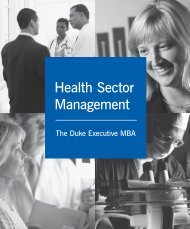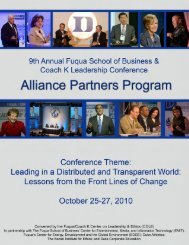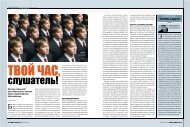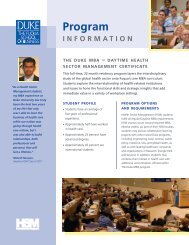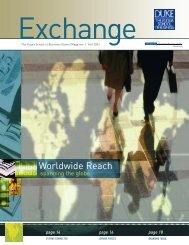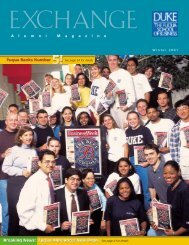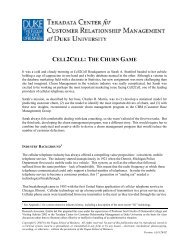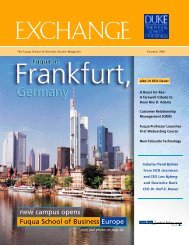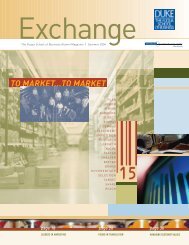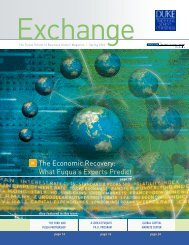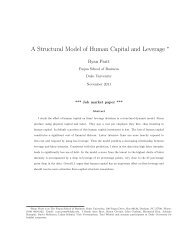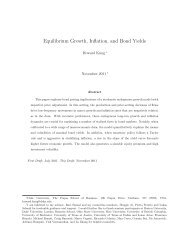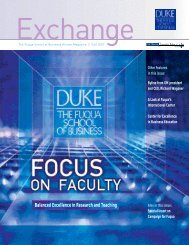Douglas T. Breeden - Duke University's Fuqua School of Business
Douglas T. Breeden - Duke University's Fuqua School of Business
Douglas T. Breeden - Duke University's Fuqua School of Business
You also want an ePaper? Increase the reach of your titles
YUMPU automatically turns print PDFs into web optimized ePapers that Google loves.
Mary Frances Luce Pr<strong>of</strong>essor <strong>of</strong> Marketing<br />
Research focus: Health care marketing and decision making<br />
Courses: Health Care Marketing (The <strong>Duke</strong> MBA—Daytime and<br />
Weekend Executive); <strong>Business</strong> Management Principles and Tools<br />
for Nephrologists in the 21st Century (Executive Education);<br />
Seminar in Consumer Behavior (PhD)<br />
A <strong>Fuqua</strong> graduate who returned to the marketing faculty<br />
in 2003, Mary Frances Luce (PhD ’94), seeks to understand<br />
the role <strong>of</strong> emotion in decision making, particularly<br />
in situations involving high-stakes decisions and<br />
health-related decisions.<br />
Luce and her research collaborators are working to<br />
bridge the gap between marketing knowledge and health<br />
behaviors. “Many people in marketing are interested in<br />
explaining the behavior <strong>of</strong> the consumer population,” Luce<br />
said, “and marketing has lots <strong>of</strong> tools that get people to<br />
adopt certain behaviors.” Luce notes that one challenge <strong>of</strong><br />
applying marketing thought and knowledge to health<br />
behaviors is the intervening role that emotion can play in<br />
health-related decisions.<br />
“For example, it is quite common for a woman who has a<br />
mammogram to receive false-positive test results,” says<br />
Luce <strong>of</strong> her interest in the emotional responses women<br />
have to the experience <strong>of</strong> false positive test results—since<br />
for a time these women are forced to live and cope with the<br />
possibility that they may have breast cancer. In many cases<br />
women may be dissuaded from having regular mammograms<br />
because <strong>of</strong> the fear <strong>of</strong> a possible cancer diagnosis<br />
that is generated by a false positive test result, especially in<br />
combination with the physical discomfort <strong>of</strong> the actual<br />
mammogram process. On the other hand, says Luce, the<br />
stress <strong>of</strong> a false positive test can be counterbalanced by<br />
the feeling <strong>of</strong> vulnerability it elicits in many women<br />
because “it makes them think, which can be motivating<br />
toward testing and protective behavior.”<br />
Luce and her colleague Barbara E. Kahn have found<br />
that you can decrease these women’s levels <strong>of</strong> anxiety by<br />
providing them with some simple coping behaviors and<br />
interventions to help them manage the stress <strong>of</strong> false<br />
positive test results.<br />
Luce also explores the emotions that are generated by<br />
the process <strong>of</strong> making decisions. This is joint work with<br />
<strong>Fuqua</strong> colleagues Jim Bettman and John Payne. The team<br />
has explored emotions that are generated by considering<br />
the trade<strong>of</strong>fs that are inherent in most decisions.<br />
Of particular interest to Luce are situations that are<br />
considered “low probability/high consequence.” Such<br />
decisions are fundamentally different from general<br />
consumer decisions, says Luce. In low probability/high<br />
consequence decision situations, people will seek to<br />
minimize and manage the emotions that result from the<br />
decision process, which in turn will alter the person’s<br />
decision. “In the past, researchers might argue people<br />
would opt out <strong>of</strong> certain decisions because they were<br />
conserving cognitive resources, a view that can make<br />
consumers sound ‘lazy,’” she says, “but we’ve since<br />
learned that sometimes people don’t do the right thing<br />
because it is emotionally costly.”<br />
For instance, in the domain <strong>of</strong> car purchases, people are<br />
<strong>of</strong>ten willing to sacrifice safety for price when shopping for<br />
a new car. “People want a safe car, but safety is not the only<br />
factor they consider when shopping. In order to manage the<br />
emotions that are brought about<br />
when considering ‘what if’ scenarios<br />
about the need for car safety, we<br />
shoppers may use another consideration<br />
to rule out choices,” Luce<br />
says. For example, people may<br />
exclude all cars over a certain price,<br />
and then use safety as a key consideration<br />
within their remaining purchase<br />
options. In the process <strong>of</strong> trying<br />
to manage their emotions, people<br />
may initially rule out the safest<br />
car by labeling it “too expensive,”<br />
even if it is only slightly more<br />
expensive than the car they ultimately<br />
end up purchasing.<br />
Luce’s work has led her to conclude<br />
that people <strong>of</strong>ten want to simplify<br />
their decision-making processes in<br />
a way that minimizes the emotional costs <strong>of</strong> trade<strong>of</strong>fs. “So<br />
it is easier to use some sort <strong>of</strong> rule to eliminate a choice<br />
from consideration than to go through the emotional exercise<br />
<strong>of</strong> weighing the pros and cons <strong>of</strong> a particular option,”<br />
she notes.<br />
Luce cites <strong>Duke</strong>’s intellectual environment and focus on<br />
interdisciplinary work as driving forces behind her decision<br />
to return here. She also credits her students with providing<br />
new perspectives and insights to her work. “There are great<br />
synergies between the classroom and my research,” she<br />
says. A resident from <strong>Duke</strong> University Medical Center<br />
participates in Luce’s <strong>Duke</strong> MBA—Daytime health care<br />
marketing course, and provides an interesting counterpoint<br />
to discussions <strong>of</strong> health care marketing strategy and tactics.<br />
“And in turn, I think it helps the resident to see the ways in<br />
which health care marketers affect physicians,” says Luce.<br />
Luce also teaches in The <strong>Duke</strong> MBA—Weekend<br />
Executive program and finds that hearing about health<br />
care managers’ problems first hand provides her with<br />
new questions to explore in her research. “We have a broken<br />
health care system, but it is not clear how to fix it,” she<br />
says. “We have many opportunities to bring management<br />
tools into the marketplace to help bring about positive<br />
change. My teaching here at <strong>Duke</strong> helps me see tremendous<br />
opportunities to bring research to bear on the practice <strong>of</strong><br />
health care communication and marketing.”<br />
summer 2007 29



